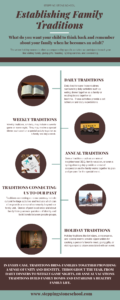Family Traditions
The winter holiday season is often accompanied by specific activities we participate in each year like visiting family, giving gifts, feasting, lighting candles, and celebrating. These traditions often go back generations in one form or another. Research demonstrates that family traditions are valuable for building strong family relationships and developing a sense of belonging between family members.

When children are invited to participate in family traditions by talking about the reasons behind these special activities, the traditions become more meaningful often providing a sense of family history, culture, or religious heritage. Furthermore, children are more likely to continue such family traditions if they understand why these traditions are valued within your family.
Over the next several weeks, the children at Stepping Stone School will learn about Holiday customs and family celebrations as well as participate in Stepping Stone School traditions like the Annual Holiday Family Celebration and Tree Trimming Ceremony.
Each tradition begins through active planning and habit.
- Daily traditions are those routines surrounding daily activities such as eating dinner together as a family or reading books together at bedtime. These activities provide a set schedule and daily expectations.
- Weekly traditions, similarly, may include a weekly game or movie night. They may involve a special dinner each week or a special activity together as a family one day a week.
- Annual traditions such as an annual neighborhood BBQ, family vacation, or even a spring cleaning day provide a sense of cooperation as the family works together to plan and prepare for the special event.
- Traditions connecting us to our past may include cultural heritage activities and festivals which can often provide a sense of community beyond our family unit. Stories of past loved ones and about family history answer questions of identity and build bonds between people groups.
- Holiday traditions like birthdays, anniversaries, and special events provide opportunities for cooking a person’s favorite meal, giving gifts, or visiting a special place associated with an event.
In every case, traditions bring families together providing a sense of unity and identity. Throughout the year, from daily dinners to weekly game nights, or annual vacations traditions build family bonds and establish a healthy family life.
Think about the family traditions you participated in as a child. As you move into the holiday season and then into the New Year, are there traditions you wish to begin? What do you want your child to think back and remember about your family when he becomes an adult?

Resources:
Argosy University. (n.d.). The Psychology and Science of Tradition & Ritual. Retrieved from https://www.argosy.edu/our-community/blog/the-psychology-and-science-of-traditions-ritual
Brenner, A. (2014, May 29). 5 Ways to Create Family Traditions. Retrieved from https://www.psychologytoday.com/us/blog/in-flux/201405/5-ways-create-family-traditions
Council on Foundations. (n.d.). The Effects of Family Culture on Family Foundations. Retrieved fromhttps://www.cof.org/content/Effects-Family-Culture-Family-Foundations
Davies, L. (2006, August). Family Traditions and Children. Retrieved from http://www.kellybear.com/ParentTips/ParentTip10.html
Griswold, A. (n.d.). Traditions Are Important in Families. Retrieved fromhttps://web.extension.illinois.edu/ccdms/facts/121204.html
Healthychildren.org (2015, November 21).Normal Functioning Family.Retrieved from https://www.healthychildren.org/English/family-life/family-dynamics/Pages/Normal-Family-Functioning.aspx